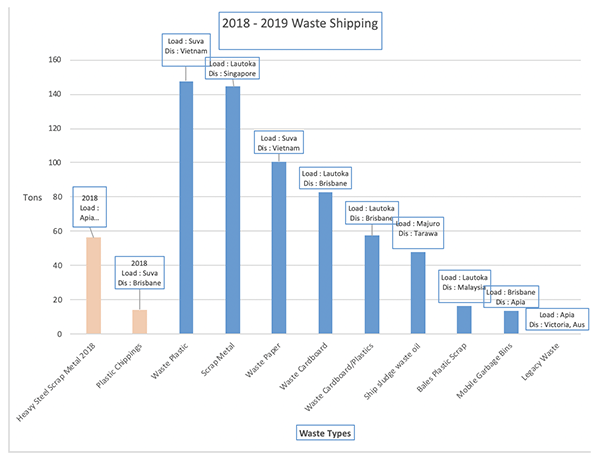The Secretariat of the Pacific Regional Environment Programme (SPREP) has reported on progress in waste management in Pacific island countries made under the Moana Taka Partnership. Since its launch in March 2018, approximately 686 tonnes of waste have been shipped from eligible Pacific islands and territories for treatment and recycling in suitable ports in the Asia-Pacific region.
The Partnership between SPREP and the China Navigation Company (CNCo), also known as SWIRE Shipping, allows for CNCo vessels to carry, free of charge, containers of recyclable waste from eligible ports in Pacific island countries and territories that have insufficient or inappropriate landfill space to store waste, have inadequate waste treatment facilities, and lack financial capacity to ship recyclable waste.
Kosi Latu, Director General of SPREP, has described the Moana Taka Partnership as a “paddle in the right direction” towards tackling the “immense waste management challenge” in Pacific islands.
The focus of the Partnership is on non-commercial waste streams and the types of materials that are considered recyclable, including plastics, aluminum cans, waste oil, and ozone depleting substances. Twenty-one Pacific island countries and territories are eligible to participate in the scheme.
Examples of shipments of recyclable waste made thus far include: six containers of scrap metal from Samoa and Papua New Guinea; nine containers of plastic waste from Fiji; three containers of used oil from the Marshall Islands; and 16 containers of varied waste contents from Fiji.
The Partnership contributes to implementation of the Pacific Regional Waste and Pollution Management Strategy 2016-2015, ‘Cleaner Pacific 2025,’ a “comprehensive long-term strategy for integrated sustainable waste management and pollution prevention and control in the Pacific islands region until 2025.” Priority areas for management outlined in the Strategy include municipal solid waste, asbestos, electrical and electronic waste (e-waste), healthcare waste, chemicals (such as persistent organic pollutants (POPs), ozone depleting substances, and mercury), used oil and lubricants, marine litter, ship-sourced pollution, disaster waste, and liquid waste (such as sewage and trade waste).
As such, the initiative forms an important contribution towards achieving SDG 12 (responsible consumption and production) and Article 10 (Disposal of Waste) of the Noumea Convention for the Protection of the Natural Resources and Environment of the South Pacific Region and Related Protocols. [Pacific Environment Portal] [SDG Knowledge Hub Story on Launch of Moana Taka Partnership] [SDG Knowledge Hub Sources]

* * *
This story was made possible with funding support from the Government of Sweden through the UN Environment Programme (UNEP) and was developed with the Secretariat of the Pacific Regional Environment Programme (SPREP) using the Pacific Environment Portal, which enables users to find, access, and use regional and national data. The portal has been developed by the regional UNEP-GEF Inform project executed by SPREP, which has established national environment data portals in 14 Pacific island countries to help address the challenges of storing and accessing data. The online database of information and datasets aims to help improve decision making and reporting on the environment.